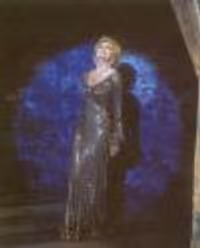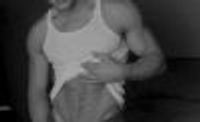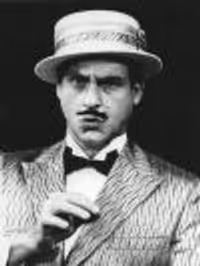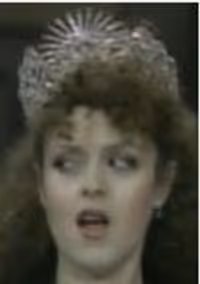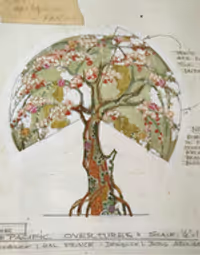Follies Entr'acte
#1Follies Entr'acte
Posted: 5/8/13 at 11:05pmHello, I was wondering if the 2011 Revival of "Follies" added an Entr'acte since it was divided into two acts. I know when the original production had two acts during Try-outs and Previews they added a brief Entr'acte, but it was eliminated when they made the show into a one-act. Any help would be loved!
#2Follies Entr'acte
Posted: 5/8/13 at 11:07pmIt was just the flute playing that continued on from 'Too Many Mornings' and the scene directly after the song.
RuprechtJr.
Featured Actor Joined: 6/22/05
#2Follies Entr'acte
Posted: 5/9/13 at 8:35amIn the score, it's measure 109 to the end of Too Many Mornings. Oboe feature on melody, Violin takes over on final phrase.
#3Follies Entr'acte
Posted: 5/9/13 at 2:41pmIt is EXACTLY the same music that ended act 1 to lead into EXACTLY the moment in the scene we ended. It is the most arbitrary and ridiculous act break. Just silly. Just one example of how poorly constructed and poorly directed that revival was.
Phyllis Rogers Stone
Broadway Legend Joined: 9/16/07
#4Follies Entr'acte
Posted: 5/9/13 at 3:09pm
To be fair (and I agree there's plenty of criticism to found with the revival), that's now the established act break all around. It's where it's placed in the script now and it's where the Paper Mill and the Roundabout productions ended it.
I hate the show with an act break, period, but ultimately I've come to the decision that it works best where it is than anywhere else. A production I did once ended the act with "I'm Still Here," which was kind of inexplicable. There's something to be said with having it end with "Who's That Woman," since that's a rousing and crowd-pleasing number, but the end of Too Many Mornings has Buddy and Young Buddy discovering Ben and Sally as the song ends, so at least there's some sort of conflict.
#5Follies Entr'acte
Posted: 5/9/13 at 3:44pm
yeah I guess it just seems sloppy to me that they start with the exact music they ended with... like they couldn't be bothered to figure out a better way to start the second act.
it's just sloppy.
#6Follies Entr'acte
Posted: 5/9/13 at 4:00pm
The only reasons it "needs" an intermission are:
1) Many actors love to pause and drag out their lines to get as much stage time as possible (this was really in evidence in the most recent revival)
2) Many directors/choreographers can't stage a show so that the momentum and excitement build so inevitably, no one wants an intermission.
#7Follies Entr'acte
Posted: 5/9/13 at 4:19pm
How about a third reason:
Follies is not a short show, and theater audiences these days tend to be fairly elderly, so how about giving them a bathroom break?
#8Follies Entr'acte
Posted: 5/9/13 at 6:08pm
"yeah I guess it just seems sloppy to me that they start with the exact music they ended with... like they couldn't be bothered to figure out a better way to start the second act.
it's just sloppy."
My god.
1. Obviously the reason it is done this way is to cover up that there was an intermission/make it clear that not a second of time has passed in the story - which is usually the obvious implication of an intermission in many many many musicals (Sweeney Todd, Gypsy, Sunday in the Park etc. I mean it's impossible to list)
2. As you might know, this revival actually removed the intermission for a few performances during previews to test it out. The cast recording also hides the fact that there was an intermission by breaking the discs at the end of "who's that woman". The fact that the intermission stayed is not a reflection of how 'misconceived' the production apparently was at all.
#9Follies Entr'acte
Posted: 5/9/13 at 6:23pm
I agree with Phyllis (and the original creators) that there is no good place for an act break.
But those who saw the show in LA can attest that with Victoria Clark, Ron Raines really cut loose, and "Too Many Mornings" began to verge on grand opera.
It at least provided a "big number" with which to end the first act.
(And, yes, the second act then resumed awkwardly, as it always does.)
#10Follies Entr'acte
Posted: 5/9/13 at 7:14pmSpeaking of the 2011 Revival, since they did "Follies Lite", what was cut/changed/moved (From the Recording, it sounds like Sally's closing scene was moved to after Phyllis', which I actually like better right before the Finale)?
#11Follies Entr'acte
Posted: 5/9/13 at 8:24pm
I dont' think the show works with the intermission. It has to build, inexorably, to Loveland, as the original did.
That said, I wouldn't mind an intermission after a spectacular version of "I'm Still Here" with a second act that began with Stella saying "Hit it, baby" and going right into "Who's That Woman?"
At least the 1st would end and the 2nd act would begin with numbers that hit two major themes of the show: yes, we're still here, but who the hell are we, anyway?
#12Follies Entr'acte
Posted: 5/9/13 at 8:40pm
Interesting idea, Joey, but wouldn't Act I be infinitely weaker without "Who's That Woman" taking its rightful place after "In Buddy's Eyes"?
I'd happily see Act I end on the high note of "Who's That Woman", and then leave it to a powerhouse Carlotta to yank the audience back to attention with "I'm Still Here".
#13Follies Entr'acte
Posted: 5/9/13 at 8:49pm
Those arguments make sense in terms of dynamics, but until Buddy catches Ben and Sally in a clinch, there isn't enough conflict in the plot to leave us wondering what comes next.
Basically I agree with PJ, but I fear today's audiences' intolerance of the slightest discomfort would lead to dozens of interruptions as audience members left for and returned from the bathroom.
#14Follies Entr'acte
Posted: 5/9/13 at 8:59pmI'm too lazy to check my live audio--how long did the show run, time wise, in its original production? I seem to think that, like Pippin in one act, it ran around 140 minutes, which I suppose many would think is pushing it. (Chorus Line, IIRC comes in at a pretty tight 2 hours.)
Phyllis Rogers Stone
Broadway Legend Joined: 9/16/07
#15Follies Entr'acte
Posted: 5/9/13 at 9:19pmI have three recordings from the original production and one runs 2 hours, 13 minutes (but that's the one that sounds like it's a bit sped up). The other do are 2h18m and 2h19m.
#16Follies Entr'acte
Posted: 5/9/13 at 10:03pm
I'd happily see Act I end on the high note of "Who's That Woman", and then leave it to a powerhouse Carlotta to yank the audience back to attention with "I'm Still Here".
I like that even better.
But the show doesn't work with an intermission. It only works without one.
And it doesn't really work without one either.
That is the paradoxical and bitter truth about Follies.
One of them, at any rate.
#17Follies Entr'acte
Posted: 5/10/13 at 2:57pm
"And it doesn't really work without one either."
Wait, PJ, are you actually saying you think that either way, the show doesn't really work?
This coming from one of our very best commentators on the lasting legacy of this show, who's regaled us with great stories based on your viewings of the original (if I recall correctly, with a boy you reconnected with to view the 2011 revival decades later...) All this from a treasured poster who now reveals to us that you don't really think the show works? Well I'm dashed. (And reluctantly agree with the assessment.)
#18Follies Entr'acte
Posted: 5/10/13 at 5:25pm
It's the greatest show I ever saw, but, no, it hasn't ever "worked"...meaning that despite my love for it in 1971, everyone I brought to it was left cold by it. (Except the bf you mentioned and my cousin Arlene, who was an art student.)
For decades, I treasured my memories of the original production and felt like I was the only one who loved it, then I came to BroadwayWorld and met others who loved it--and some who had memorized every moment of it through soundboards and videos.
Then the Paper Mill and the Kennedy Center revivals happened and lots of people loved it.
But, no, it doesn't "work" with an intermission, and it doesn't work without one.
It's still the greatest show I ever saw and probably the greatest show I'll ever see.
#19Follies Entr'acte
Posted: 5/10/13 at 5:32pmAs usual, PJ explains it quite well. I loved FOLLIES from the original production, but I usually call that afternoon in 1971 "the best 2-and-a-half hours I ever spent in the theater", which is not quite the same as "the greatest show".
#21Follies Entr'acte
Posted: 5/10/13 at 7:45pm
There's something a little sad about saying my best theatrical experience occurred when I was 17. Talk about 42 years of disappointment!
But since I don't expect revivals to measure up, last year's FOLLIES in LA did not disappoint. It didn't equal the original, but it was exhilarating all the same!
(I hope it's clear that PJ and I are not arguing. We are just using different semantics to explain the apparent paradox that one's favorite show may not be the show one considers "best" in all respects.)
Updated On: 5/10/13 at 07:45 PM
#22Follies Entr'acte
Posted: 5/10/13 at 7:45pm
I talked in another thread about the difference between productions, the show you see in a place, at a time, with a cast, and shows, the texts and materials that provide the bones around which the production is built.
Follies, I believe we are arguing here, can succeed as a production more than as a text. You can see a good Follies or enjoy seeing Follies without saying that Follies works. It's the intellectual equivalent of what Wicked is for flash and spectacle, and Pippin is for dance ingenuity- the show doesn't work, but the production can make or break your opinion nonetheless.
#23Follies Entr'acte
Posted: 5/10/13 at 9:24pm
Well I'm at a disadvantage having never seen the 1971 original. But I did see the 1985 concert, the 1988 West End production, the 2000 Roundabout production, the summer 2011 DC revival, the Chicago Shakespeare Festival version and the final Broadway version in fall of 2011 (the last 2 both in one crazy weekend in fact). I read and reread "Everything is Possible" for glimpses into the legend. You can see how determined I was to find the show I'd imagined from listening to the score all those years.
And as God as my witness, I don't think the show actually worked in ANY of those incarnations, despite all sorts of brilliance scattered through every iteration.
A glorious glorious almost workable show.
AwesomeDanny
Broadway Legend Joined: 7/30/09
#24Follies Entr'acte
Posted: 5/10/13 at 11:14pm
The 1987 London production did actually move I'm Still Here to the opening of the second act, where I think it really belongs. If you're doing the show with an intermission (which isn't the best choice), I think that I'm Still Here should open the second act because in its current slot, it can easily be a much bigger moment than Too Many Mornings.
What exactly do you all mean when you say that the show has never really worked? And why? Is it because of the almost plotless nature of the show? I don't think we can come to an objective answer, though. Opinions of this show, like all good art, are just opinions and not facts.
Videos


